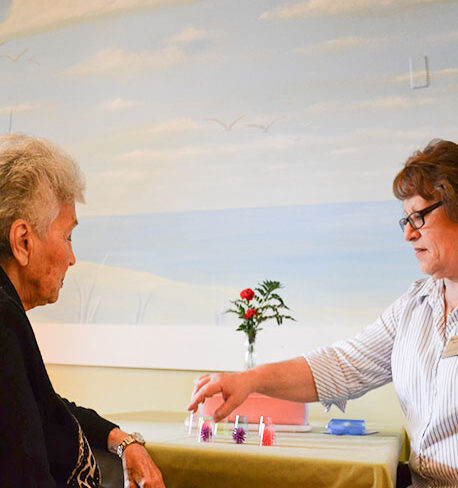Challenging behaviors are common among adults diagnosed with Alzheimer’s disease. While the triggers aren’t always easy to determine, sometimes a person’s surroundings may contribute.
Understanding difficult behaviors and being aware of a few steps you can take to prevent them may help improve the quality of life for a loved one with Alzheimer’s.
What Causes Behavior Problems in People with Alzheimer’s
The Alzheimer’s Association recommends a three-step approach to determining the cause of negative dementia-related behaviors:
- Examine the behavior. What triggered your loved one’s negative response? Is he or she in pain or discomfort? Did something he or she saw or heard cause them to become over stimulated? Could he or she be experiencing side effects from a new medication? Whenever possible, try to find the cause of the behavior and determine whether it can be prevented or adjusted in the future.
- Explore potential solutions. Is the behavior a result of a chaotic environment? It could be time to reorganize your loved one’s surroundings.
- Try different responses. It could take some trial and error for you to figure out what works to reduce your loved one’s stress. When you find a suitable solution, document it so that you can try to use it again if the negative behavior returns.
Managing Common Behavior Issues
Negative behaviors are different in every person with Alzheimer’s. But there are some that are more common:
Aggression
- Rule out pain or discomfort. Your loved one might be reacting in an aggressive way because he or she is in pain and doesn’t have the verbal ability to express that.
- Is the senior overly tired? Sleep problems are common in people with Alzheimer’s. And fatigue can contribute to aggression.
Look for the potential causes behind your loved one’s behavior, not the words and actions themselves. This will also help you not take it so personally your loved one acts aggressively toward you.
Anxiety
- Again, rule out discomfort or pain.
- Take time to listen to your loved one’s concerns and respond in a calm, soothing tone.
- Distract your senior with a pleasant and relaxing activity.
- If you cannot remove your loved one from the room he or she is currently in, try to adapt the environment. For example, turning off the TV or radio might help restore calm.
Wandering/Getting Lost
- Often the urge to wander comes from being restless. Encourage your loved one to take part in light activity, like walking or folding clothes.
- Alert neighbors and friends. Caregiving takes teamwork, and it’s helpful to have as many eyes looking out for your loved one as possible.
- Install locks on doors. Yes, locks can always be unlocked, but they are a deterrent. They might give you just enough time to catch someone from leaving the premises. The same is true for a home security system.
- Use a location tracker, such as a wristband with a panic button. If your loved one does wander, you can quickly track his or her location.
No one wants to dwell on negative behaviors. However, when you are proactive in preventing or minimizing stress, a loved one with Alzheimer’s can enjoy a better quality of life.

